Friday Philosophicals

New Term, New Students: Usually the titles of two seminars appear here.
Friday Philosophicals
A weekly seminar series run by the Ecology & Evolution group, allowing graduate students and others to present their research in a collegial environment. All talks are 10-30 minutes in length, followed by up to 5 minutes of questions, with open discussion from the floor. Typically, two speakers will present on a given day. The Friday Philosophicals is an excellent opportunity to learn the rough and tumble of giving scientific talks, gain feedback from faculty and peers – give feedback to your fellow presenters – and, above all, learn about science, biology and effective science communication.
Friday Philosophicals run most Fridays in Kresge Building K106 (check the schedule). Seminars start at 3:30 pm and are expected to end by 4:20 pm.
For incoming students, the Friday Phils provides an excellent forum to present your proposed research in the form of hypotheses, experimental design and intended use of a field, lab or analytical techniques. For outgoing students, the forum is ideal for summarizing your key findings and explaining their broader significance.
Attendance is required of graduate students in the E&E stream, and guests are welcome, including visitors to the department and aspiring undergraduates. The seminar series represents Part 2 (Communication) of BIO 9100y/9150y. Although occasional absences are expected, consistent absence is considered poor form and may result in a grade of ‘Unsatisfactory’ with implications for funding eligibility. Should you go? Yes! Your fellow grad students will appreciate your support – as you will theirs. Besides, it's just fun!
2024-2025 Organizer
| Date | Presentations | ||
|---|---|---|---|
| 22-Nov-24 | Holly Deighton PhD exit |
||
| 29-Nov-24 | João Martin MSc entry |
Chloe Stevenson MSc entry |
|
| 6-Dec-24 | Will VanHemessen MSc update |
Jude Dunukumara Udumullage MSc entry |
|
| 10-Jan-25 | Paige Ferguson MSc entry |
Evelyn Petro MSc entry |
Evan Michael Bennett MSc entry |
| 17-Jan-25 | Evan Gillis MSc entry |
Kiran Hazra MSc entry |
|
| 24-Jan-25 | Ada Jarosch MSc entry |
Laura Bax MSc entry |
Carson Mitchell MSc entry |
| 31-Jan-25 | Madison Robinson MSc entry |
Aastha Saini PhD proposal |
Tristan Ducharme PhD proposal |
| 7-Feb-25 | AJ Randolph-Westerhof MSc entry |
Ben Souriol PhD proposal |
|
| 14-Feb-25 | Scout Thompson PhD proposal |
Parker Van Belleghem MSc update |
|
| 21-Feb-25 | Reading Week | ||
| 28-Feb-25 | Emelie Obi MSc update |
Amedeo Cortese MSc update |
|
| 7-Mar-25 | Alexander Niski MSc update |
Liam Carter MSc update |
|
| 14-Mar-25 | Natalie Tateishi MSc update |
Tessa Fortnum MSc update |
|
| 21-Mar-25 | Kevin Adeli MSc update |
Emad Hazboun MSc update |
|
| 28-Mar-25 | Julia Lacika MSc update |
Eva Visscher MSc update |
|
| 4-Apr-25 | Bruch Malloch PhD exit |
Scott Walters PhD exit |
|
| 11-Apr-25 | Maedeh Barzmehri PhD proposal |
Mika da Silva Lima PHD entry |
|
January 10, 2025
Paige Ferguson: Landscape analysis of soil organic carbon and microbial community variation under historical and current land use at 5 CDSB Gagetown
 Supervisors: Dr. Robert Buchkowski
Supervisors: Dr. Robert Buchkowski Globally, soils store more carbon than vegetation and the atmosphere, combined, mitigating climate change through carbon sequestration. In addition to climatic variability, human activity through land use has caused a massive quantity of soil carbon to be liberated and released into the atmosphere. There is uncertainty surrounding soil carbon modelling due to the dynamic and complex nature of soil carbon cycling, and recent shifts in theory realize microbial communities as a leading factor in organic carbon stabilization. My research will use field and laboratory methods alongside an existing robust data set to demonstrate the legacy of historical and current land use in soil organic carbon variation and identify how land use influences microbial community structure. My work has important implications for carbon modelling and land management, especially related to long-term effects of land use on soil carbon and the importance of using microbially-explicit carbon models.
Evan Bennett: Effects of Temperature on Dispersal of Parnassius smintheus
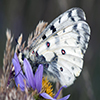 Supervisors: Nusha Keyghobadi
Supervisors: Nusha Keyghobadi Insects rely on external temperatures in order to properly function, however high temperatures combined with extended periods of activity can easily push butterflies into heat stress. The species Parnassius smintheus, or Rocky Mountain Apollo, lives in exposed meadows found along the Rocky Mountains, and are thus subject to direct sunlight and high temperatures for the majority of their flight season. In order to mate, some butterflies will travel between meadows, with distances between meadows ranging between 1 and 10km. Dispersing individuals are relatively rare to find, and so my research seeks to determine whether or not individuals who undergo this short distance migration are better equipped to withstand higher temperatures, due to how intense this flight is. Through use of a flight mill outfitted with a heating element and a thermal camera, performance curves will be assembled to compare individuals who disperse between meadows, and those who do not.
Evelyn Petro: The relationship between prolactin, perceived paternity, and parental care in bluegill sunfish

Bluegill sunfish (Lepomis macrochirus) are native to North America and exhibit male parental care and alternative mating strategies, leading to two types of males: parental and cuckolders. Parental males are larger and take care of the young, while cuckolder males are smaller and steal fertilization from parental males using either a sneaking or female mimicry tactic. Previous research has shown that the presence of cuckolder males around nests during spawning reduces the parental male’s perceived paternity, subsequently reducing circulating concentrations of prolactin, an important hormone regulating parental care in many species. These males then provide less care to the offspring in their nest. My research aims to determine if administration of prolactin reverses the cue of reduced paternity (the presence of cuckolder males around the nest) that ultimately leads to less parental care, providing insight into the relationships between all three variables, and the underlying mechanisms for parental care decisions.
January 17, 2025
Evan Gillis: Plant Litter Manipulation Effects on Detritivores and Nitrogen Cycling in an Old-Field Community
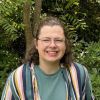 Supervisors: Dr. Robert Buchkowski
Supervisors: Dr. Robert Buchkowski Plant litter plays a crucial role in shaping ecosystems by influencing soil nutrients and local species populations. However, despite their distinct plant communities and ecological dynamics, old-field ecosystems remain understudied compared to other environments regarding the effects of plant litter. Human land management practices, such as mowing and leaf litter removal, alter the quality and quantity of plant litter, driving changes in ecosystem structure and function. Plant litter can be broadly categorized into two types: green, non-senesced litter, and brown, senesced litter. Through litter manipulation experiments in an old-field ecosystem, my research will explore how varying amounts of different types of plant litter affect nitrogen cycling and detritivore populations. This work will deepen our understanding of the role of plant litter in nutrient cycling and detritivore communities and offer valuable insights into sustainable land management practices.
Kiran Hazra: The biogeography of rainbow smelt (Osmerus mordax)
 Supervisors: Bryan Neff
Supervisors: Bryan Neff Rainbow smelt (Osmerus mordax) are native to eastern North America, in freshwater and oceanic habitats as far west as Ottawa. A large, introduced population was established in the Great Lakes in the 1900s, and smelt have subsequently spread across the Canadian interior. Previous research has shown that rainbow smelt produce thiaminase, an enzyme which induces thiamine deficiency in predators with diets high in smelt. This is one of the factors contributing to the decline of salmon and trout in the Great Lakes. My research aims to determine which Ontario smelt populations are native and establish the timing of postglacial dispersal events. I will then determine whether the thiaminase gene is under selection in different lakes across Ontario and the United States.
January 24, 2025
Laura Bax: Adaptive selection in environmentally associated SNPs in Parnassius smintheus
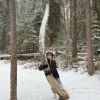 Supervisors: Dr. Nusha Keyghobadi
Supervisors: Dr. Nusha Keyghobadi Climate change has increased the frequency and intensity of extreme weather events, especially in alpine environments. A species of butterfly native to the Rocky Mountains, Parnassius smintheus, has been the subject of long-term population data collection. This species overwinters as larvae before becoming adult butterflies in the summer. At the long-term study site, three bottlenecks in population size have been observed over the last 30 years, with previous research reporting that unfavorable weather during November is particularly detrimental to summer adult population sizes. Genome-environment association analyses at a broader spatial scale have identified single nucleotide polymorphisms under selection associated with environmental variables relevant to overwinter survival, such as snow cover and minimum/maximum temperatures in early winter. This suggests that extreme weather events might result in changes in adaptive genetic diversity. My research aims to determine whether allelic frequencies of environmentally-associated SNPs are altered following observed population bottlenecks in Parnassius smintheus.
Ada Jarosch: Survey of Ectomycorrhizal Fungi Communities in Carolinian Canada
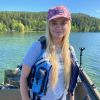 Supervisors: Greg Thorn
Supervisors: Greg Thorn Mycology is an expanding field of study and there is still much about the ecology of fungi that is unknown. Ectomycorrhizal fungi (ECM) live in soil and for symbiotic relationships with vascular plants. Some species produce fruiting bodies which are well recognized but less is known about the below ground community. Carolinian Canada is the most biodiverse region of Canada but lacks documentation of ECM. My research aims to document and understand the community dynamics of ECM in the region. I will collect root samples of known ECM host trees and perform molecular identification to determine what species of fungi are present. Then perform multivariate analysis to explore ECM community composition and factors that influence it. The sequences will be annotated with and added to NCBI GenBank to improve future ECM identification.
Carson Mitchell: Genomics-Informed Conservation: Exploring Inbreeding and Genetic Rescue in Bighorn Sheep
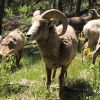 Supervisors: Dr. David Coltman
Supervisors: Dr. David Coltman Inbreeding (mating between relatives) and inbreeding depression (the phenotypic consequences of inbreeding) are increasing due to habitat fragmentation and population declines. One proposed solution is genetic rescue: introducing genetically distant individuals into a population to promote genetic mixing, reduce deleterious homozygosity, and increase heterozygosity, thereby enhancing fitness and resilience to change. My research focuses on a bighorn sheep population that experienced population decline and subsequent genetic rescue. Using SNP, pedigree, and observational data, I aim to (1) compare theoretical and realized inbreeding coefficients, (2) identify genomic regions associated with inbreeding depression, and (3) evaluate the efficacy of genetic rescue. Ultimately, this work will contribute to the growing body of evidence supporting the use of genomics to study inbreeding and inform conservation strategies for large, long-lived mammals.
January 31, 2025
Tristan Ducharme: The influence of ecological variation on the spatial distribution and reproductive success of alternative reproductive tactics in bluegill sunfish
 Supervisors: Bryan Neff
Supervisors: Bryan Neff Within sex differences in reproductive tactics can be found in many species and likely evolve through sexual selection. Alternative reproductive tactics (ARTs) involve differences in behaviour, physiology and morphology. Bluegill (Lepomis macrochirus) are characterized by ARTs with males adopting either “parental” or “cuckolder” tactics. Parentals delay maturation investing in growth before competing for nesting sites within a breeding colony. Cuckolders instead mature precociously, initially adopting a sneaking tactic and later mimicking females to achieve fertilizations. I will firstly examine the influence of multiple ecological factors on the success and distribution of cuckolders. Additionally assessing female mating preferences by examining the influence of parental male behaviour and cuckolder density on the frequency of egg deposition and the number of females spawning in nests. At the mechanistic level, I will determine if parentals can differentiate between females and satellites based on odour cues and attempt to identify specific cues used for mimicry.
Madison Robinson: The Biology of Newly Discovered Bog Copper populations in Georgian Bay
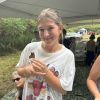 Supervisors: Dr. Nusha Keyghobadi
Supervisors: Dr. Nusha Keyghobadi Tharsalea epixanthe (Bog copper) is a butterfly species that is highly specialized to feed on two North American cranberry plants, Vaccinium macrocarpon and Vaccinium oxycoccos, during their entire lifecycle. This specialization has led to them being recognized as peatland specialists as cranberry plants typically require peatland conditions to grow. As such, T. epixanthe are usually found in bogs containing cranberry plants. In Georgian Bay, T. epixanthe have been documented for the first time on isolated islands that contain cranberry patches, but not typical peatland. Questions have arisen regarding how they have populated these unique habitats. My research focuses on the genetic differentiation of the mainland and island populations of bog coppers, using microsatellite markers to determine genetic similarity or difference. I aim to establish whether these populations have diverged from their mainland counterparts, or whether these habitats have recently been colonized.
Aastha Saini: Illuminating Avian Sleep: Understanding the Impact of Artificial Light at Night on Memory Consolidation
 Dr. Scott MacDougall-Shackleton
Dr. Scott MacDougall-Shackleton Daily light-dark rhythms regulate essential biological processes in animals, synchronizing internal physiology with the external environment. Artificial light at night (ALAN) is a rapidly growing environmental pollutant that disrupts natural photoperiodic cues, interrupting these rhythms. Such disruption negatively impacts animals, particularly their sleep-wake cycles and related processes, including memory consolidation. However, few studies have focused on ALAN’s impact on sleep and memory in wildlife. My research will focus on the detrimental effects of ALAN on memory consolidation in black-capped chickadees (Poecile atricapillus), a passerine songbird dependent on spatial memory for winter survival. I will use different light intensities to manipulate light-dark cycles and assess cognitive changes in these birds by performing memory tasks. Additionally, I will examine the long-term effects of ALAN on the hippocampus, a brain region associated with spatial learning. My study aims to improve our understanding of ALAN’s harmful effects on memory, particularly in diurnal species.
February 7, 2025
AJ Westerhof: Nonrandom Mate Choice at TLR loci In Song Sparrows (Melospiza melodia) and its relation pathogen-mediated balancing selection.
 Supervisors: Elizabeth MacDougall-Shackleton
Supervisors: Elizabeth MacDougall-Shackleton Toll-like Receptor proteins (TLRs) represent a critical role in innate immune responses due to their binding of highly-conserved traits of pathogens, & as such are subject to strong selective pressure. This typically manifests as balancing selection, where individuals are more likely to be heterozygous at loci that relate to pathogen recognition. This heterozygosity may empower these individuals to recognize a broader range of pathogens. Non-random mate choice can amplify the diversifying effect of pathogen-mediated balancing selection, with individuals preferentially seeking partners dissimilar at these immune loci. I will identify socially-mated pairs of Song Sparrows (*Melospiza melodia*) present in long-term study population. I will then sequence 3 candidate TLRs, TLR1LB, TLR15, & TLR21, and will compare the genetic distance between mated individuals seen to relatedness expected under random mating. I will then use the TLR sequences obtained to screen these loci for signatures of historical balancing selection.
Ben Souriol: The Role of Plant Litter in Soil Insulation from Frost: Implications for Fire, Atmospheric Nitrogen Deposition, and Variations in Plant Productivity
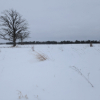 Supervisors: Hugh Henry
Supervisors: Hugh HenryPlant litter can insulate overwintering plants from severe freezing during winter. Nevertheless, the ecological role of plant litter as a soil insulator has been generally overlooked in the context of plant productivity. My goal is to determine the role of plant litter in soil insulation from frost in the context of other global change factors (i.e. fire and atmospheric nitrogen deposition) that affect litter production. I am conducting a suite of litter addition and removal field experiments combined with fire and nitrogen addition treatments, and examining their effects on plant productivity and relative species abundance. I will combine these with snow removal treatments to vary freezing intensity. I also will examine how litter thickness drives trade-offs between protection from winter freezing versus the presence of a physical barrier and shading that can delay plant emergence and growth in spring.
February 14, 2025
Scout Thompson: Evolutionary ecology of immune genes: heterozygosity-fitness correlations, mate choice, and chemical cues of genotype in song sparrows (Melospiza melodia)
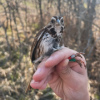 Supervisors: Beth MacDougall-Shackleton
Supervisors: Beth MacDougall-ShackletonCompatible-genes models of mate choice often predict non-random mating. Such models posit that if heterozygosity-fitness correlations exist at a locus, e.g. the major histocompatibility complex (MHC), individuals should choose optimally similar mates to produce optimally heterozygous offspring. However, non-random mating also requires assessing compatibility (genotype). In song sparrows (Melospiza melodia), fitness measures covary with individual diversity at both class I and II MHC, but non-random mating is restricted to class II. This may reflect compatibility being assessed through smell, reflecting the community composition of odour-producing symbiotic bacteria. If so, non-random mating may only be possible at bacterial-facing loci. I will characterize three bacterial-facing and three viral-facing immune loci, and genome-wide neutral SNPs, to evaluate: 1) how fitness (apparent survivorship) varies with heterozygosity, 2) how genetic similarity covaries with preen oil volatile chemistry, 3) whether non-random mating is restricted to loci that fulfil 1) and 2).
Parker Van Belleghem: Artificial light at night and the migratory stopover behaviour of thrushes
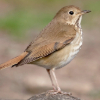 Supervisors: Yolanda Morbey
Supervisors: Yolanda MorbeySomething about artificial light at night’s effect on migration behaviour of Swainson’s Thrushes and Hermit Thrushes.
February 28, 2025
Emelie Obi: Temperature and moisture effects on oribatid mite communities in boreal peatlands
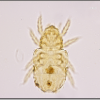 Supervisors: Zoe Lindo
Supervisors: Zoe LindoTemperature and moisture are two key factors expected to change under current and future climate projections, with significant impacts on ecosystems and biological communities. In northern latitudes, boreal peatlands, known as major carbon stores, are particularly vulnerable to these changes. Alterations in temperature and moisture levels may shift peatlands from carbon sinks to carbon sources by influencing decomposition dynamics, primarily through effects on below-ground communities. Therefore, I used both field and controlled lab experiments to study the effects of temperature and moisture on the most dominant below-ground microarthropod community in boreal peatlands—Oribatida. I found significant changes in community composition, driven by the increase in smaller sized species, and this led to a decline in average community body size. Overall, temperature was observed to have a stronger effect than moisture.
Amedeo Cortese: Fear as a management tool: Scaring predators with predators to protect imperiled shorebird nests
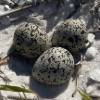 Supervisors: Liana Zanette
Supervisors: Liana ZanetteNest predation is a main driver of shorebird population declines globally. We harness the fear of predators as a tool to deter mesocarnivores from entering shorebird nesting habitat and depredating nests. We first establish that mesocarnivores most fear human predator vocalizations compared to dog and control playback treatments. Following this, we deployed “virtual fences” broadcasting human vocalizations at entry points leading to shorebird nesting habitat. Standardized track transects and trail cameras were used to monitor mesocarnivores at nesting sites and we found significantly less intrusions into nesting habitat during human playback periods compared to control periods. Human playbacks were effective at reducing shorebird nest mortality, but this varied across shorebird species and was dependent on the size of nesting habitat to be protected. Our findings provide a blueprint for wildlife practitioners to use this non-lethal management tool to protect prey from predators during critical times, such as during nesting.
March 7, 2025
Alexander Niski: Variable legacy effects on soil organic matter density fractions in a long-term multifactor global change field experiment
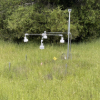 Supervisors: Hugh Henry
Supervisors: Hugh HenryGlobal change factors can impact the ability of soil to store carbon, but a crucial detail is whether changes are transient or long-term. The Jasper Ridge Global Change Experiment was a multifactorial field experiment that ran from 1998 to 2016. We examined the legacy effects of the experimental treatments (CO2 enrichment, nitrogen addition, water addition and warming) on soil organic matter by comparing soil collected near the end of the experiment to soil collected eight years after the experiment ceased. Density fractionation was used to separate the organic carbon into particulate organic matter (relatively labile) versus occluded and mineral-associated fractions (more recalcitrant). A variety of significant effects were revealed, both near the end of the experiment and after it ceased. Overall, our results reveal variation among global change factors in the strength of their legacy effects on soil carbon fractions, which has implications for their long-term effects on carbon storage.
Liam Carter: Telomere dynamics of a wild population of a long-lived marine mammal: an observational study on the grey seals (Halichoerus grypus) of Sable Island
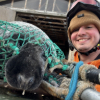 Supervisors: David Coltman
Supervisors: David ColtmanTelomeres play a central role in cell fate, with the rate of telomere length (TL) shortening affected by intrinsic (chronological aging) and extrinsic (stress) factors. The largest breeding colony of grey seals (Halichoerus grypus) on Sable Island, Nova Scotia, has grown exponentially since resighting and resampling efforts started in 1983 and has since approached its carrying capacity between 2016 and 2021. Sable Island presents a unique opportunity to investigate variation in TL across lifespan and between cohorts in a population of long-lived marine mammals. I will use an established qPCR method of absolute telomere length (aTL) measurement on skin samples from post-wean pups and branded adults collected from 1998 onward. I will use longitudinal samples of branded individuals to quantify the effect of intrinsic factors on TL over lifespan and samples between cohorts of pups to quantify the effect of extrinsic factors on TL in an increasingly stressful early-life environment.
The Philosophicals:
As part of your degree, you are asked to give seminars on your research (this is the second part of Bio 9100y/9150y: Communications). Giving seminars is a good thing. The idea here is to get feedback from a wide range of people to help you along in your research, and to get you feeling comfortable with public speaking. The environment is friendly, thus this is the perfect place to practice that very important Proposal Assessment talk, or the talk you plan to give at an upcoming conference.
A brief outline of what is expected:
MSc students give one 10-20 minute talk in the first year of their degree, and a 20 minute talk in their second year. PhD students give one 20 minute talk during the second year of their degree and then a 30 minute talk near the end of their degree. A ‘before’ and ‘after’, if you will.
When it is your turn to present:
Please send thain@uwo.ca an e-mail by 5 pm of the Friday prior to your talk. Your email should include:
1. Your name
2. Your supervisor's name
3. Degree being sought
4. The title of your talk
5. A single-spaced abstract of up to 150 words.
6. One digital photo as a jpg file, for posting on the website.
Here is an example of a title and abstract for your seminar:
The identification of genes differentially expressed in sterile and reproductive honey bee workers ( Apis mellifera)
A fundamental issue of sociobiology is to understand how social insect females regulate their individual reproduction to maximize inclusive fitness. In general, honey bee ( Apis mellifera) workers remain sterile throughout their short lives, while they function as helpers to the queen, who is the sole egg-layer of the colony. The environmental cues controlling this behaviour are understood, but the underlying gene regulatory networks are not. In this study, we have manipulated the pheromonal cues that regulate reproduction and have analyzed the gene expression differences between sterile and reproductive workers using oligonucleotide microarrays. Preliminary analysis shows two distinct sets of co-regulated genes: one set associated with sterility, and a second set associated with egg-laying. I interpret these gene expression patterns in the context of social theory.
What to do before your talk:
Talks will be presented in Kresge Building 106. Please consult with the coordinator ( thain@uwo.ca) one week in advance to discuss some presentation tips.
A Brief History of Friday Philosophicals
The origins of today’s Ecology-Evolution “Friday Philosophicals” stretch back at least to the early-mid 1970s; maybe there was something even before that, but nearly forty years is as far back as Jack Millar can remember.
Back then, there were two weekly Collip events, which have since become crunched into the one that now happens on Fridays. The Friday event (the “Philosophical”) was simply an end-of-week beer-in-the-fridge session; it originally took place in Collip 104 (since migrating to 208, then to 112 – where we also had a dart board!), with supply duties rotating weekly among the lab groups. Anyone wanting a beer and a chat on a Friday afternoon was welcome, and the custodians were among the regulars. Eventually, it had to become more secretive as the university tightened up its campus beer policy.
Then there were the “Wednesday-Niters”; these were sessions permitting the informal discussion of grad students’ research projects, and they took place in the homes of faculty, around the town. The grad-of-the-day arrived with notes, overheads, a stand-up screen and a two-four or two and made a presentation of their ideas, data, conclusions etc., as appropriate to their stage. The discussions were spirited and great fun, often lasting well into the night: presenters learned the rough & tumble business of presenting and defending their views on their feet, and the rest honed their thinking & questioning skills. All agreed they were a grand institution, and they formed a truly distinctive part of Western’s E&E group experience. On top of being an excellent tool in professional and intellectual development, they comprised a very important piece of the group's social furniture, generating great esprit de corps. But eventually, faculty retired and/or moved out of town until by the later 80s-early 90s we had only 2 locations for most of the winter, early fall and late spring sessions being held at out of town locations.
Eventually it was suggested that the two weekly events be merged. Thus was born the modern Friday Phils format: seminars plus weekly brews in a single Collip location starting off in Collip 208, since migrating to 112, where the last sessions took place in spring 2010. Our swelling graduate ranks have since forced a move from the Collip spaces, so Fall 2010 sees the Friday Phils take their next steps. Let’s hope that its future unrolling will continue to generate a fruitful and fun experience for all.

